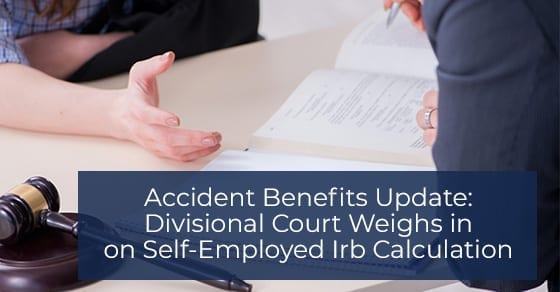
In Surani v. Perth Insurance Company (2018 ONSC 7254), the Divisional Court reviewed a Financial Services Commission of Ontario (FSCO) appeal that found the applicant, Mrs. Surani’s post-accident business income should be deducted from her Income Replacement Benefit (IRB) entitlement.
Mrs. Surani and her husband were injured in a collision in December 2010. Prior to the collision, she worked as a pharmacist in one of the pharmacies owned by the family. Post-collision, the business continued to produce income, from which she received periodic payments.
Following rehabilitation, Mrs. Surani attempted to return to work but was unable to do so and was forced to hire a replacement. She continued to perform modest tasks related to the business.
Because she was unable to return to work, Mrs. Surani applied for IRBs with her insurer, Perth. A dispute arose over the amount of the IRB. Perth claimed that income from the business must be deducted from any amount it owed. Mrs. Surani argued that she was unable to earn income as a pharmacist, so no amounts should be deducted.
At arbitration, the FSCO arbitrator determined that Mrs. Surani’s post-collision business income should not be deducted from her IRB entitlement, because she was not actively engaged in the business- therefore it was not "earned" as defined in the Statutory Accident Benefits Schedule (SABS).
Perth appealed the decision. The Director’s Delegate agreed with Perth that Mrs. Surani’s post-collision income should be deducted. He found that the arbitrator had erred by concluding that active engagement is required for self-employed business income to be considered earned.
Mrs. Surani sought judicial review, claiming that the Director’s Delegate decision had misinterpreted the SABS. The Divisional Court considered whether the decision was reasonable given the facts.
The parties agreed that Mrs. Surani was self-employed and that she received both salary and dividend income form the business. The debate centred on section 7(3) of the SABS:
The insurer may deduct from the amount of an income replacement benefit payable to an insured person,
- 70 percent of any gross employment income received by the insured person as a result of being employed after the accident and during the period in which he or she is eligible to receive an income replacement benefit;
- 70 percent of any income from self-employment earned by the insured person after the accident and during the period in which he or she is eligible to receive an income replacement benefit.
Mrs. Surani argued that the distinction in the two subsections between "received" and "earned" income was determinative- "earned" implied active participation on the part of the self-employed person. If the legislature had meant for self-employed income to be all amounts received as a result of the business, it would have used "received" for both. In support of this position, she pointed out that the legislature had replaced "received" by "earned" in s. 7(3)(b) during the drafting process.
The Court disagreed. As the Director’s Delegate had explained in the appeal, subsection 4(3) of the SABS states that income for self-employed persons will be determined in accordance with Part 1 of the Income Tax Act, which deals with income or loss from a business. Under s. 9 of the ITA, the taxpayer’s income from a business or property is the "profit from that business or property for the year." Subsection 4(4) of the SABS address the losses suffered by self-employed claimants, again with reference to Part 1 of the ITA. For example, a self-employed claimant can deduct the reasonable salary of a replacement worker if they are unable to work. As a result, the Director’s Delegate concluded that the post-collision income and losses of a self-employed person are those of the business, and that IRB calculations for Mrs. Surani should proceed from this perspective. The Court accepted this decision as reasonable and dismissed the application for judicial review.
If you are self-employed and have been seriously injured in a car accident, and have questions relating to your Income Replacement Benefit or your accident benefits generally, please do not hesitate to contact us for a free consultation. At Campisi LLP, our practice is driven by our "Clients First, Excellence Always" philosophy. Put us to work for you.
Subscribe to our newsletter
Get free insights delivered right to your inbox
Give us your email address and we’ll send you the latest information on updates to the legal and insurance system and learn how you can make the best recovery possible.
.jpg?width=726&height=440&name=image%2013%20(1).jpg)
Recent Posts
Put our expertise to work for you.
If you or a loved one has been seriously injured, you need a personal injury lawyer who puts client care first and who also knows how to navigate the complex legal system.
Contact Us Now